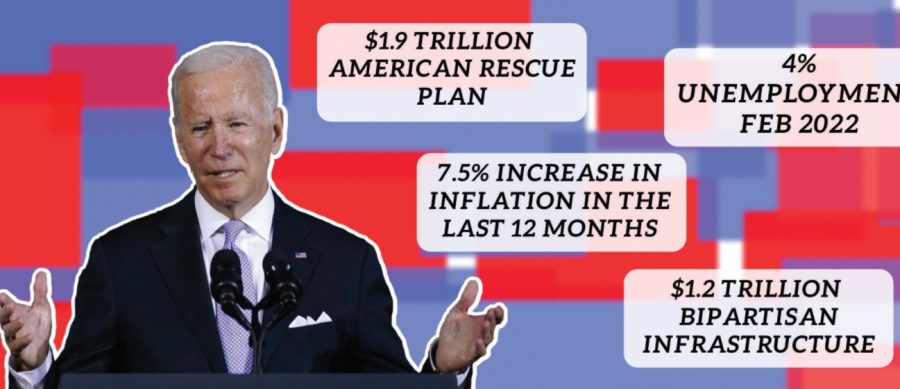Dwindling approval plagues Biden’s first year
After being elected by over 81 million voters in the record-breaking 2020 election, President Joe Biden has spent his first year in office implementing his sweeping agenda. While he has faced opposition in Congress and falling approval rates, these difficulties have proved to be a surmountable challenge for the veteran politician.
The ongoing COVID-19 pandemic has been a continuous challenge for the Biden Administration, causing hundreds of thousands of deaths and millions of cases. To combat the virus’s spread, Biden has pushed to increase vaccine and testing availability to all Americans. However, despite such efforts, only 64% of Americans are fully vaccinated, per a study done by the National Public Radio. These low vaccination rates have allowed new variants, such as Delta and Omicron, to cause increasingly large case waves, straining medical systems across the nation.
“I believe Biden should take further action. Perhaps another temporary shut down to ease any form of panic,” sophomore Alexandria Harris-Mekes said via Discord. “I’d see a public update on research involving more effective vaccinations to be the best form of reassurance that the problem is being handled.”
According to YouGov, Biden’s approval ratings have recently fallen as low as 42% due to rampant inflation rising to 7% of the GDP. In addition, the ongoing Great Resignation has put a damper on job prospects across the country.
“Inflation is also hitting the pocketbooks of everyday Americans hard, but it is important to note that most developed countries are dealing with record-high inflation,” senior Mingyu Liu said. “I think the Biden Administration has identified the right issue at hand: for over 20 years America has outsourced its supply chains.”
Over the course of the pandemic, stressed supply chains have been forced to handle rapidly rising levels of shipping. To address this issue, the President has promoted an America COMPETES Act to increase funding and research for STEM business fields and work towards domestic supply chains.
Despite this recent success, Democrats have encountered some difficulty in passing legislative measures, even while having majority control of both the House of Representatives and the Senate. For example, Biden’s $1.75 billion Build Back Better Plan was rejected and replaced by a pared-down $1 billion Infrastructure Law that only addressed some of the original stipulations.
“I’ve been particularly pleased to see that Biden, along with party leadership from both sides, work together to craft a bipartisan bill that has invested historic amounts of dollars to repair our nation’s crumbling infrastructure,” Liu said.
Another pressing issue for the Biden Administration is the military escalation in Ukraine—a prominent challenge for his international diplomacy policy. Russia recently mobilized 100,000 troops on its border with Ukraine, threatening an annexation of the beleaguered country.
“I want Biden to send troops to Ukraine in order to push back Russian aggression,” junior Jeffrey Huang said via Discord. “I do not want a democratic nation to fall to an authoritarian state.”
In the past few weeks, the President has wavered between responses toward the Ukraine crisis, including instituting economic sanctions, proposing open-communication diplomacy and inciting a full-scale military response.
“I think that the Biden Presidency’s main message has been that Democrats deliver,” Liu said. “From getting shots in arms to small business relief, it has been refreshing to see a sense of normalcy return to government.”
While Biden grapples with turmoil within the country and international issues, the United States continues to approach the 2022 midterms. It remains to be seen how the incumbency disadvantage will affect Capitol Hill and the remainder of Biden’s presidency.
Your donation will support the student journalists of Diamond Bar High School. Your contribution will allow us to purchase equipment and cover our annual website hosting costs.









